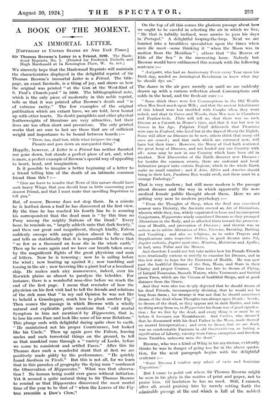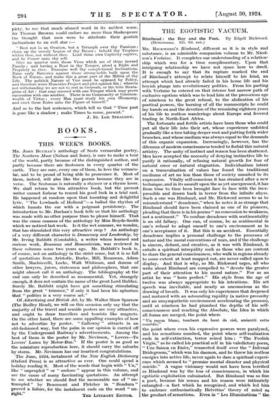A BOOK OF THE MOMENT.
AN IMMORTAL LETTER.
[COPYRIGHT IN UNITED STATES BY New York Times.] Sir Thomas Browne's Letter to a Friend, 1690. The Hasle- wood Reprints, No. 1. (Printed for Frederick Etchells and Hugh Macdonald at la Kensington Place, W. 63. net.) WE sincerely hope that the Haslewood Reprints will maintain the characteristics displayed in the delightful reprint of Sir Thomas Browne's immortal Letter to a Friend. The title- page, an exact facsimile, is a thing of joy, and shows us how the original was printed "at the Gun at the West-End of S. Paul's Church-yard" in 1690. The bibliographical note, which is the only piece of modernity in this noble reprint, tells us that it was printed after Browne's death and "is of extreme rarity." The few examples of the original
• publication which are extant have, we are told, been bound up with other tracts. No doubt pamphlets and other physical featherweights of literature are very attractive, but their lives are too often short and precarious. The only printed works that are sure to last are those that are of sufficient weight and importance to be bound between boards :—
" These, too, shall last, while what fatigues the ring Flaunts and goes down an unregarded thing."
Happily, however, A Letter to a Friend has neither flaunted nor gone down, but stands a perfect piece of art, and, what is more, a perfect example of Browne's special way of appealing to heart, head, and imagination.
Is it possible to imagine a better beginning of a letter to a friend telling him of the death of an intimate common friend than this ? :—
" Give me leave to wonder that News of this nature should have such heavy Wings, that you should hear so little concerning your dearest Friend, and that I must make that unwilling Repetition to tell you."
But of course, Browne does not stop there. In a minute he is hotfoot down a trail he has discovered at the first view. By the time he has reached his fourth line he is assuring his correspondent that the dead man is "by this time no Puny among the mighty Nations of the Dead." Every hour, he reminds us, "largely addeth unto that dark Society," and then our great and magnificent, though kindly, Falcon suddenly swoops with ample pinion almost to the earth, and tells us statistically that it is impossible to believe that "so few as a thousand an hour die in the whole earth." Then up he soars again and we have our breath taken away by the magnificent flights of the great physician and man of letters. Now he is towering; now he is sailing before the wind ; now beating up against it ; now tumbling and tossing in the air ; now hovering like a giant leaf or a becalmed ship. He makes such airy manoeuvres, indeed, over his Norwich plains as almost to paralyze the beholder. For instance, there is a wonderful nose-dive before we reach the end of the first page. I mean that reminder of how the physician on his first visit had to tell the friends and relations of the sick man that "in my sad Opinion he was not like to behold a Grasshopper, much less to pluck another Fig." Then comes the passage in which Browne with a wholly natural and explicable pride mentions that "odd mortal Symptom in him not mention'd by Hippocrates, that is, to lose his own Face and look like some of his near Relations." This plunge ends with delightful daring quite close to earth. "He maintained not his proper Countenance, but looked like his Uncle." Then up again goes the Falcon, leaving uncles and such terrestrial things on the ground, to tell us that mankind runs through a "variety of Looks, before we come to consistent and settled Faces." After this Sir Thomas. does such a wonderful stunt that at first we arc positively made giddy by the performance. "He quickly found Sardinia in Tivoli." But this is not all, for we learn that in this paradox of geography the dying man "confirmed the Observation of Hippocrates." What was that observa- tion? No human being could ever guess without initiation. Yet it seemed a quite natural thing to Sir Thomas Browne to remind us that Hippocrates discovered the most mortal time of the year to be that of "when the Leaves of the Fig- tree resemble a Daw's Claw.". On the top of all this comes the glorious passage about how we ought to be careful in selecting the air in which we live. 'He that is tabidly inclined, were unwise to pass his days in 'Portugal." A delightful looping-the-loop. Next we are hurried into a breathless speculation upon the 'times when men die most—some thinking it "when the Moon was in motion from the Meridian" ; others that "the Recess or Ebb of the Sea" is the uncreating hour. Nobody but Browne would have enblazoned this remark with the following sentence :— " Antipater, who had an Anniversary Fever every Year upon his Birth day, needed no Astrological Revolution to know what day he should dye on."
The dance in the air goes merrily on until we are suddenly drawn up with a curious reflection about Consumptions and colds in the head, and the fresh-air cure :—
" Some think there were few Constunptions in the Old World, when Men lived much upon Milk ; and that the ancient inhabitants of this Island were less troubled with Coughs when they went naked, and slept in Caves and Woods, than Men now in Chambers and Feather-beds. Plato will tell us, that there was no such Disease as a Catarrh in Homer's time, and that it was but new in Greece in his Age. Polydore Virgil delivereth that Pleurisies were rare in England, who lived but in the days of Henry the Eighth. Some will allow no Diseases to be new, others think that many old ones are ceased.; and that such which are esteemed new, will have but their time : However, the Mercy of God hath scattered. the great heap of Diseases, and not loaded any ono Country with - all : some may be new in one Country which have been old in another. New Discoveries of the Earth discover new Diseases : • for besides the common swarm, there are endemial and local Infirmities proper unto certain Regions, which in the whole Earth make no small number : and if Asia, Africa and America should bring in their List, Pandoras Box would swell, and there must be a strange Pathology."
That is very modern ; but still more modern is the passage about dreams and the way in which apparently the non- medical female public thought about them. Here we are getting very near to modern' psychology :— " From the Thoughts of Sleep, when the Soul was conceived nearest unto Divinity, the Ancients erected an Art of Divination, wherein while they, too, widely expatiated in loose and inconsequent Conjectures, Hippocrates wisely considered Dreams as they presaged Alterations in the Body, and so afforded hints toward the preserva-. tion of Health, and prevention of Diseases ; and therein was so serious as to advise Alteration of Diet, Exercise, Sweating, Bathing and Vomiting ; and also so religious, as to order Prayers and Supplications unto respective Deities, in good dreams unto Sol, Jupiter coelestis, Jupiter apulcnlus, Minerva, Mercurius and Apollo ; in bad, unto Tellus and the Heroes.
And therefore I could not but take notice how his Female Friends were irrationally curious so strictly to examine his Dreams, and in this low state to hope for the Fantasm_s of Health. He was now past the healthful Dreams of the Sun, Moon, and Stars in their Clarity and proper Courses. 'Twas too late to dream of Flying, of Limpid Fountains, Smooth Waters, white Vestments and fruitful green Trees, which are the Visions of healthful Sleeps, and at good distance from the Grave.
And they were also too deeply dejected that he should dream of his dead Friends, inconsequently divining, that he would not be long from them ; for strange it was not that he should sometimes dream of the dead whose Thoughts run always upon Death : beside, to dream of the dead, so they appear not in dark Habits, and take no thing away from us, in Hippocrates his Sense was of good significa- tion for we live by the dead, and every thing is or must be so before it becomes our Nourishment. And Cardan, who dream'd that he discoursed with his dead Father in the Moon, made thereof no mortal Interpretation ; and even to dream that we are dead, was no condemnable Fantasm in old Oneirocriticistn, as having a signification of Liberty, vacuity from Cares, exemption and freedom from Troubles, unknown unto the dead."
Browne, who was a kind of Whig in his mysticism, evidently thinks he was in danger of going too far in the above quota- tion, for the next paragraph begins with the delightful sentence :—
"Some Dreams I confess may admit of cask: and feminine Exposition."
But I came to point out where Sir Thomas Browne might be seen in his glory in the matter of print and paper, not to praise him. Of laudation he has no need. Still, I cannot, after all, avoid praising him by Merely setting forth the admirable passage at the end which is full of the noblest
piety, to use that much abused word in its noblest sense. Sir Thomas Browne could endure no more than Shakespeare the thought that men were to attribute their goatish inclinations to an evil star :—
" Rest not in an Ovation, but a Triumph over thy Passions ; chain up the unruly Legion of thy Breast ; behold thy Trophies within thee, not without thee. Lead thine own Captivity captive, and be Caesar unto thy self. Give no quarter unto those Vices which aro of thine inward Family ; and having a Root in thy Temper, plead a Right and Propriety in thee. Examine well thy complexional Inclinations. Raise early Batteries against those strong-holds built upon the Rock of Nature, and make this a great part of the Militia of thy Life. The politick Nature of Vice must be opposed by Policy, and therefore wiser Honesties Project and plot against Sin ; wherein not withstanding we are not to rest in Generals, or the trite Strata- gems of Art : that may succeed with one Temper which may prove successless with one another. There is no Community or Common- wealth of Virtue ; every Man must study his own (Economy, and erect these Rules unto the Figure of himself."
And so to the last sentences, which tell us that "Time past is gone like a shadow ; make Times to come, present."
J. ST. LOE STRACHEY.



































 Previous page
Previous page